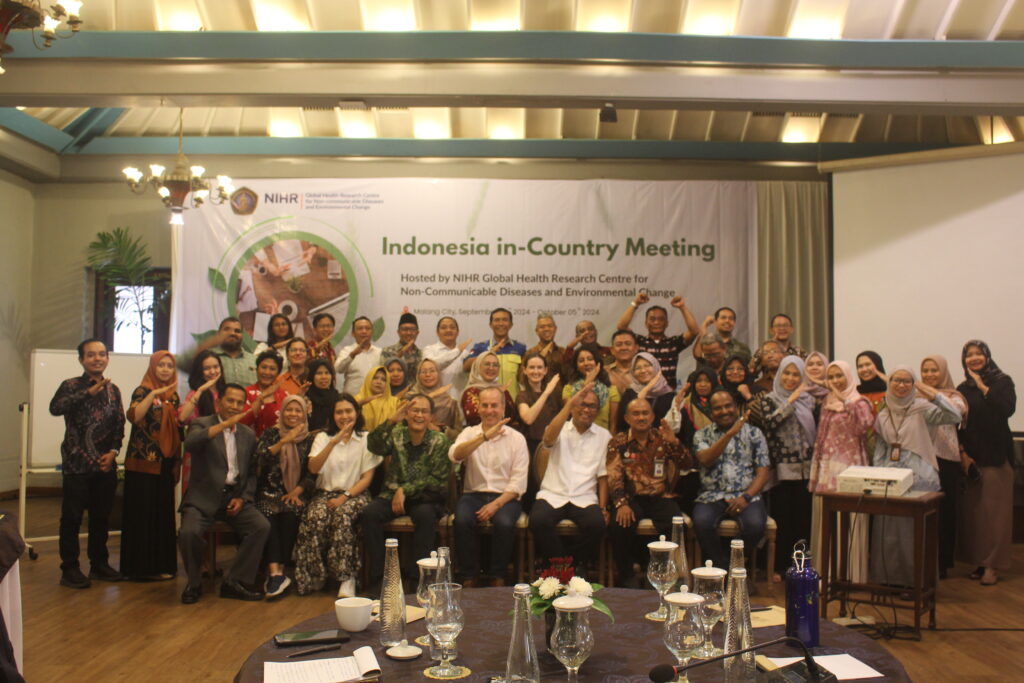
Collaboration and networking play a crucial role in research, facilitating the exchange of ideas, resources, and expertise across disciplines and institutions. By fostering strategic partnerships, researchers can integrate diverse perspectives to address complex challenges more effectively. Strong networks also provide access to the latest information and cutting-edge technologies, accelerating innovation and enhancing the quality and impact of research outcomes. Through meaningful collaborations, we are committed to driving scientific advancements that create positive global change.
In Indonesia, the NIHR Global Health Research Centre for Non-Communicable Diseases and Environmental Change (NIHR GHRC for NCDs and EC) actively builds collaborations and networks with leading global institutions. Our key partners include Imperial College London (ICL), The George Institute for Global Health in India and Australia, the International Centre for Diarrhoeal Disease Research, Bangladesh (icddr,b), Sri Ramachandra Institute of Higher Education and Research (SRIHER), and the University of Manchester (UoM). These collaborations enable us to leverage collective expertise and resources to advance research and develop impactful solutions to pressing global health and environmental challenges.


Imperial College London is a world-leading public research university located in London, England, renowned for its focus on science, engineering, medicine, and business. Established in 1907, Imperial has consistently ranked among the top universities globally, achieving the No.1 position in Europe and No.2 worldwide in the QS World University Rankings 2025. The university is organized into four main faculties: Engineering, Medicine, Natural Sciences, and the Imperial College Business School, fostering a multidisciplinary approach to education and research.
The Indonesia NIHR Global Health Research Centre for Non-Communicable Diseases and Environmental Change (NIHR GHRC for NCDs and EC), based at Brawijaya University in Malang, Indonesia, is dedicated to addressing the dual challenges of non-communicable diseases (NCDs) and environmental change. The center emphasizes innovative research, world-class training, and impactful policy solutions to improve health outcomes in low- and middle-income countries. Key focus areas include primary health care strengthening, air pollution, and research capacity building.
Imperial has engaged in various projects addressing plastic pollution, such as partnering with major companies to study how to increase recycling rates and maximize the lifespan of plastics in the economy. Similarly, NIHR GHRC for NCDs and EC has explored the impact of plastic waste on health and the environment, particularly concerning air pollution from plastic combustion.
Learn More About Imperial College London (ICL)
UK International Development

UK International Development, delivered through the Foreign, Commonwealth & Development Office (FCDO), is the United Kingdom’s commitment to reducing global poverty and tackling global challenges. Its work focuses on supporting health systems, climate resilience, education, gender equality, and sustainable development worldwide. Through research and innovation partnerships, UK International Development plays a key role in strengthening evidence-based solutions and improving health outcomes in low- and middle-income countries.
Learn More About UK International Development
The George Institute for Global Health India

The George Institute for Global Health India, established in 2007, is a premier independent medical research institute dedicated to addressing the nation’s most pressing health challenges. As part of a global network with centers in Australia, China, India, and the UK, the institute focuses on generating high-quality evidence through discovery and implementation research to improve the health of millions in India. Emphasizing innovative approaches, it aims to prevent and treat common causes of premature death and disability, while promoting health equity across all populations.
The institute’s strategic priorities include finding better treatments for major health problems, transforming primary healthcare to support better health for more people, and harnessing the power of communities, governments, and markets to improve health outcomes. With ongoing projects spanning 21 Indian states and a team of over 78 professionals, The George Institute has contributed to more than 350 publications, including 40 in high-impact journals.
Under the leadership of Executive Director Professor Vivekanand Jha, the institute collaborates with a diverse team of experts to drive its mission forward. Professor Jha also serves as Professor and Chair of Global Kidney Health at Imperial College London and holds conjoint professorships at the University of New South Wales, Sydney, and the Prasanna School of Public Health, Manipal Academy of Higher Education, India.
Learn More About The George Institute for Global Health India
The George Institute for Global Health Australia

The George Institute for Global Health Australia, established in 1999 in Sydney, is a leading independent medical research institute dedicated to addressing the world’s most pressing health challenges. With major centers in Australia, China, India, and the UK, the Institute focuses on innovative approaches to prevent and treat non-communicable diseases and injuries, particularly among disadvantaged populations. Since its inception, the Institute has raised over $1 billion for research and produced more than 8,000 publications and academic outputs.
Under the leadership of Executive Director Professor Bruce Neal, the Australian branch conducts high-quality research across various health domains, including critical care, injury prevention, and food policy. The Institute’s critical care research encompasses all aspects of managing critically ill patients, from pre-hospital care to long-term recovery, aiming to provide evidence-based guidance for healthcare professionals.
The George Institute is committed to transforming primary healthcare and harnessing the power of communities, governments, and markets to improve health outcomes. Through its research, advocacy, and disruptive social entrepreneurship, the Institute strives to find better treatments for major health problems, support better health for more people, and create healthier societies worldwide.
Learn More About The George Institute for Global Health Australia
The International Centre for Diarrhoeal Disease Research, Bangladesh (icddr,b)

The International Centre for Diarrhoeal Disease Research, Bangladesh (icddr,b) is a renowned international health research organization based in Dhaka, Bangladesh. Established in the 1960s as the South-East Asia Treaty Organisation (SEATO) Cholera Research Laboratory, it has evolved into a leading institution dedicated to addressing critical public health challenges through innovative scientific research. icddr,b’s multidisciplinary team of scientists, doctors, and nurses collaborates globally to develop and implement solutions aimed at improving health outcomes, particularly in low-resource settings.
Over the years, icddr,b has made significant contributions to global health, most notably the development of Oral Rehydration Solution (ORS), a simple yet effective treatment for dehydration caused by diarrheal diseases. This breakthrough has been credited with saving millions of lives worldwide. Beyond diarrheal disease research, the organization addresses a wide range of health issues, including maternal and child health, infectious diseases, nutrition, and vaccine development. icddr,b also provides vital services such as hospital care, advanced diagnostics, and vaccination programs to the local population, thereby directly impacting community health.
In addition to its research and service delivery, icddr,b is committed to capacity building and knowledge dissemination. The institution offers extensive training programs for health professionals from around the world, sharing its expertise and fostering the next generation of public health leaders. icddr,b’s efforts are supported by a diverse group of donors and partners, including governments, international organizations, and academic institutions, all unified in the mission to solve public health problems through innovative scientific research.
Learn More About The International Centre for Diarrhoeal Disease Research, Bangladesh (icddr,b)
Sri Ramachandra Institute of Higher Education and Research (SRIHER)

Sri Ramachandra Institute of Higher Education and Research (SRIHER), located in Porur, Chennai, India, is a premier private educational institution dedicated to medical and health sciences. Established in 1985 by the Sri Ramachandra Educational & Health Trust under the leadership of Shri N.P.V. Ramasamy Udayar, the institute achieved the status of a “Deemed to be University” in September 1994 under Section 3 of the University Grants Commission Act, 1956.
SRIHER encompasses multiple constituent faculties, including the Sri Ramachandra Medical College and Research Institute, Dental College and Hospital, Faculty of Pharmacy, Faculty of Nursing, Faculty of Physiotherapy, Faculty of Allied Health Sciences, Faculty of Management Sciences, Faculty of Biomedical Sciences, Technology and Research, Faculty of Public Health, Faculty of Engineering and Technology, Faculty of Sports & Exercise Sciences, Faculty of Clinical Research, Faculty of Occupational Therapy, and Faculty of Audiology and Speech Language Pathology. These faculties collectively offer a wide array of undergraduate and postgraduate programs, fostering a multidisciplinary approach to healthcare education.
The institute is renowned for its state-of-the-art infrastructure, including a 1,800-bed tertiary care medical center equipped with the largest intensive care unit in the region. This facility serves as the focal point for clinical teaching and provides students with hands-on experience under the guidance of esteemed medical professionals. SRIHER’s commitment to excellence is further evidenced by its accreditation from the National Assessment and Accreditation Council (NAAC) with an “A++” Grade and its classification as a Category I University by the University Grants Commission (UGC).
Learn More About Sri Ramachandra Institute of Higher Education and Research (SRIHER)
The University of Manchester (UoM)

The University of Manchester, established in 2004 through the merger of the Victoria University of Manchester and the University of Manchester Institute of Science and Technology (UMIST), is a prestigious public research university located in Manchester, England. Tracing its roots back to 1824 with the founding of the Mechanics’ Institute, the university has evolved into one of the largest in the UK, boasting a diverse student population of over 46,000 as of the 2022/23 academic year. The main campus is situated south of Manchester city centre on Oxford Road, encompassing a blend of historic and modern facilities.
Renowned for its academic excellence, the University of Manchester consistently ranks among the top institutions globally. In the QS World University Rankings 2025, it secured the 34th position worldwide and 6th in the UK. The university is a member of the prestigious Russell Group, highlighting its commitment to research and innovation. Over the years, it has been associated with 25 Nobel laureates among its current and former staff and students, underscoring its rich history of groundbreaking discoveries and contributions to various fields.
The university offers a comprehensive range of programs across its three faculties: Science and Engineering, Biology, Medicine and Health, and Humanities. Students benefit from a vibrant campus life, with access to numerous clubs, societies, and state-of-the-art facilities. Manchester itself is a dynamic city known for its cultural diversity, musical heritage, and sporting achievements, providing an enriching environment for both academic pursuits and personal growth.
Learn More About The University of Manchester (UoM)
